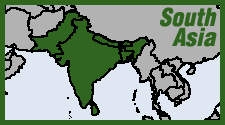 The number of drug-related offenses is "higher than any other heinous crime in Nepal and is increasing at an alarming rate," according a none-too-objective March 17 account in Kathmandu's The Himalayan newspaper. The article credulously regurgitates the claims of a new report from the country's Narcotics Control Bureau, breaking down crime figures since 2011. The total for drug offenses rises to around 1,800, while those for murder and rape remain in the hudreds, and abduction in the two-digit range. And what kinds of drugs are at issue here? We are luridly told that "cultivation of genetically selected strains have [sic] led to increase in cannabis harvests. As a result, cannabis cultivation is increasing even in the hilly areas, posing a grave threat to security, according to the report."
The number of drug-related offenses is "higher than any other heinous crime in Nepal and is increasing at an alarming rate," according a none-too-objective March 17 account in Kathmandu's The Himalayan newspaper. The article credulously regurgitates the claims of a new report from the country's Narcotics Control Bureau, breaking down crime figures since 2011. The total for drug offenses rises to around 1,800, while those for murder and rape remain in the hudreds, and abduction in the two-digit range. And what kinds of drugs are at issue here? We are luridly told that "cultivation of genetically selected strains have [sic] led to increase in cannabis harvests. As a result, cannabis cultivation is increasing even in the hilly areas, posing a grave threat to security, according to the report."
So cannabis cultivation is implicitly considered a "heinous crime" (as well as a "grave threat to security"). The report also cites "drug trafficking," but this appears to be mostly export of Nepalese hash to India.
The following quote from the report is offered: “Truly speaking, increase in the number of drug crimes is a matter of serious concern. Drug transactions worth billions of dollars take place around the world annually. Talking about Nepal, over 10 million dollars were spent on heroin and hashish in the last three years. The figure is based on the market price of drugs."
Yet lumping hash in with heroin inflates the figure, and conflates a dangerous, addictive refined powder with an herbal preparation that has been produced and consumed in Nepal for centuries, probably millennia.
The UK's Metro alternative newspaper in February ran a photo essay of sadhus (itinerant Hindu holy men) openly smoking hashish at Kathmandu's Maha Shivaratri festival. As they have since time immemorial, the sadhus oversaw rituals at the city's Pashupatinath temple to honor the god Shiva, whose favorite offering is hash. Nepal temporarily lifts the ban on cannabis for the festival so the sadhus can imbibe. The pilgrims who come from all over Nepal and India for the festival are apparently not allowed to smoke, and must settle for having their foreheads anointed with the ash by the sadhus.
Cannabis was outlawed in Nepal as late 1973—some 10 years after the isolated kingdom opened up to the outside world. The move was taken under international pressure to bring the country's legal code into conformity with the Single Convention treaty. The very next day, the Singha Durbar palace that housed the parliament was destroyed by fire—probably in protest of the cannabis ban. (It has since been rebuilt, and is now undergoing yet another reconstruction following damage in the 2015 earthquake.)
Under Nepal’s Narcotics Drug Control Act, cannabis possession can be punishable by 20 years in prison. This heavy sentence is rarely imposed. But it's sad to see Nepal—now officially a multi-party democracy rather than a closed kingdom—embracing the global prohibitionist dogma.
Cross-post to High Times







Recent comments
2 weeks 15 hours ago
2 weeks 21 hours ago
5 weeks 1 day ago
6 weeks 21 hours ago
10 weeks 1 day ago
13 weeks 6 days ago
17 weeks 6 days ago
18 weeks 5 days ago
28 weeks 5 days ago
32 weeks 5 days ago